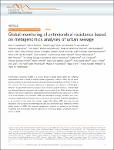Global monitoring of antimicrobial resistance based on metagenomics analyses of urban sewage
Hendriksen, Rene S.
Munk, Patrick
Njage, Patrick
van Bunnik, Bram
McNally, Luke
Lukjancenko, Oksana
Röder, Timo
Nieuwenhuijse, David
Karlsmose Pedersen, Susanne
Kjeldgaard, Jette
Kaas, Rolf S.
Lanken Conradsen Clausen, Philip Thomas
Vogt, Josef Korbinian
Leekitcharoenphon, Pimlapas
van de Schans, Milou G. M.
Zuidema, Tina
de Roda Husman, Ana Maria
Rasmussen, Simon
Petersen, Bent
The Global Sewage Surveillance project consortium
Amid, Clara
Cochrane, Guy
Sicheritz-Ponten, Thomas
Schmitt, Heike
Alvarez, Jorge Raul Matheu
Aidara-Kane, Awa
Pamp, Sünje J.
Lund, Ole
Hald, Tine
Woolhouse, Mark
Koopmans, Marion P.
Vigre, Håkan
Nordahl Petersen, Thomas
Aarestrup, Frank M.
Antimicrobial resistance (AMR) is a serious threat to global public health, but obtaining representative data on AMR for healthy human populations is difficult. Here, we use metagenomic analysis of untreated sewage to characterize the bacterial resistome from 79 sites in 60 countries. We find systematic differences in abundance and diversity of AMR genes between Europe/North-America/Oceania and Africa/Asia/South-America. Antimicrobial use data and bacterial taxonomy only explains a minor part of the AMR variation that we observe. We find no evidence for cross-selection between antimicrobial classes, or for effect of air travel between sites. However, AMR gene abundance strongly correlates with socio-economic, health and environmental factors, which we use to predict AMR gene abundances in all countries in the world. Our findings suggest that global AMR gene diversity and abundance vary by region, and that improving sanitation and health could potentially limit the global burden of AMR. We propose metagenomic analysis of sewage as an ethically acceptable and economically feasible approach for continuous global surveillance and prediction of AMR.
Files in this item

